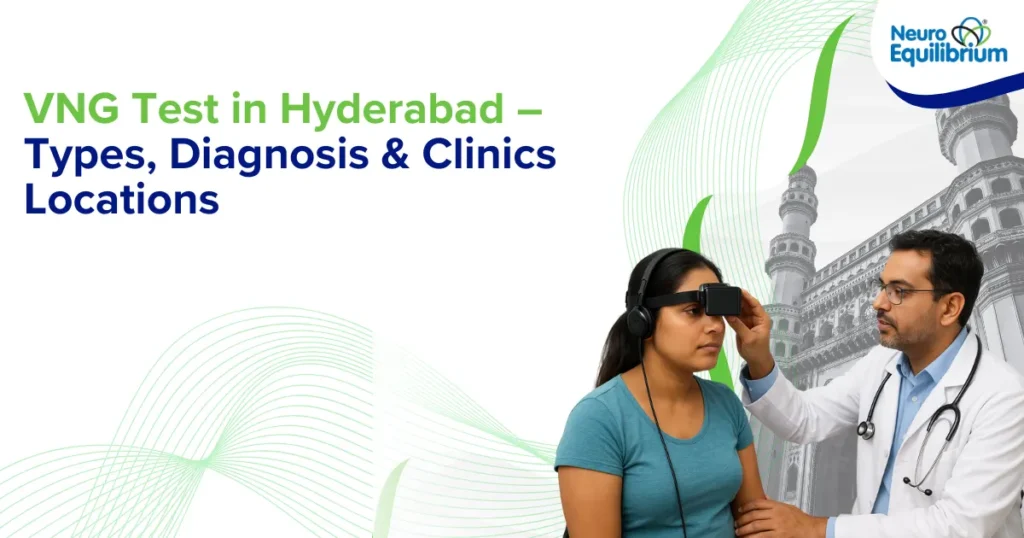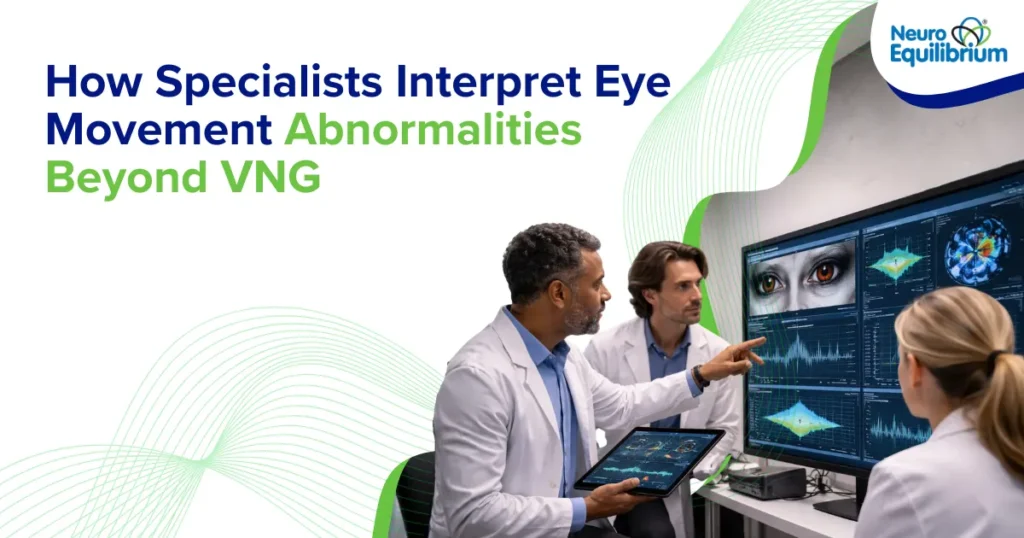Being dizzy once in a while may not worry you, but it may have a serious impact on your everyday life when it becomes very frequent or persistent. If you feel like the room is spinning, you can’t walk straight or you feel like you’re always “off balance,” it may mean that you have a problem with your inner ear or balance system.
This is where some tests such as VNG (Videonystagmography) help. These tests provide your doctor with a detailed picture of how your balance system is functioning in order to select the best treatment.
At NeuroEquilibrium Clinics at Hyderabad, we conduct special tests including VNG, DVA, SVV, Caloric Testing which provide comprehensive customized tests for every patient.
What is a VNG Test?
VNG is one of the important tests that involve the study of your eye movements, which can help to assess how well your balance system is functioning. You wear special goggles that have infrared cameras in them.
These cameras record minute, involuntary movements of the eyes called nystagmus.
By analysing these different movements, doctors know how your inner ear and brain work together to help you keep your balance.
A VNG test is typically ordered if you have:
- Vertigo: A spinning sensation, as if the room is moving around you.
- Difficulty walking straight: Feeling unsteady even when you’re standing still.
- Persistent dizziness: A floating or off-balance feeling that doesn’t go away with rest.
- Tinnitus with balance issues: Ringing or buzzing in the ears along with imbalance.
The test is non-invasive and safe, and is typically completed in approximately one hour. During the test, the inner ear is lightly stimulated by various positions and visual clues, which can help the specialists determine whether the problem is in the inner ear, the vestibular nerve, or the central pathways of balance in the brain.
Know More About the Tests for Vertigo
- VNG Test – What does it mean, how is it done and what are the results?
- Vertigo Test Cost in Bangalore VNG, DVA, SVV & More
- Difference Between VEMP and VNG Test to Diagnose Vertigo
Types of Vestibular Tests in Hyderabad
Although VNG is the test most often prescribed, many times, dizziness and balance assessments require a battery of tests to completely understand your vestibular system. Tests offered at NeuroEquilibrium Hyderabad clinics are the following:
Videonystagmography (VNG)
- Records eye movements in response to changes in visual and position.
- Helps to detect abnormal responses linked to vestibular disorders.
- Considered the gold standard to diagnose vertigo.
Dynamic Visual Acuity (DVA)
- Assess the degree of clarity at which you can see while your head is moving.
- Important for patients who perceive that their vision is shaking or becoming blurry with walking or turning of the head.
Subjective Visual Vertical (SVV)
- Tests the accuracy of your perception of what’s up or down.
- Useful in determining conditions of distorted balance perception.
When Should You Get a VNG Test?
Not all dizzy spells require testing. However, you should consider an evaluation for a balance problem if you have:
- Persistent symptoms
- Unexplained imbalance
- Recurring episodes of vertigo
- Tinnitus with imbalance
Yearly detection is especially important where it comes to conditions such as:
- Benign Paroxysmal Positional Vertigo (BPPV)
Why Opt for NeuroEquilibrium Hyderabad?
NeuroEquilibrium is one of the largest dedicated networks for dizziness and balance disorders in India. In Hyderabad, patients take advantage of:
- Advanced Technology
- Specialized Doctors
- Patient-Centric Approach
- Standardized Protocols
- Multiple Locations

Clinic Locations at Hyderabad
Each NeuroEquilibrium clinic in Hyderabad has similar diagnostic protocols and is manned by trained vestibular specialists.
NeuroEquilibrium Clinic – KPHB Colony, Hyderabad
Location: KPHB Colony, Hyderabad, Telangana
Pincode: 500072
Book Clinic Visit
NeuroEquilibrium Clinic – Jubilee Hills, Hyderabad
Location: Jubilee Hills, Hyderabad, Telangana
Pincode: 500033
Book Clinic Visit
NeuroEquilibrium Clinic – Dilsukhnagar, Hyderabad
Location: Dilsukhnagar Hyderabad Telangana
Pincode: 500036
Book Clinic Visit
NeuroEquilibrium Clinic – Somajiguda, Hyderabad
Location: Somajiguda, Hyderabad, Telangana
Pincode: 500082
Book Clinic Visit
NeuroEquilibrium Clinic – L B Nagar, Hyderabad
Location: L B Nagar – Hyderabad – Telangana
Pincode: 500074
Book Clinic Visit
Book Your VNG Test in Hyderabad
If dizziness, vertigo, or imbalance is impacting your daily life, you do not need to continue adjusting to it. The first and most important step towards relief is an accurate diagnosis.
Book your VNG test at a NeuroEquilibrium Clinic in Hyderabad today and take a confident step towards getting back your balance and quality of life.
Is a VNG test painful?
A VNG test is not painful. It is a non-invasive medical process and involves goggles monitoring your eye movements as you pursue visual targets or react to warm and cool air or water in the ears. Certain sections of the test particularly the caloric may cause brief dizziness or mild nausea, but it is temporary. Most patients feel normal within a few minutes.
What are the advantages of VNG test?
VNG offers accurate, objective information about the functioning of the inner ear and balance system. It helps determine whether dizziness or vertigo originates from the inner ear, brain, or vestibular nerve pathways. It is non-invasive, safe, and detects subtle disorders like BPPV, vestibular neuritis, and Meniere’s disease that routine examinations may miss. Results help create a targeted treatment plan.
Is a VNG covered by insurance?
Insurance coverage depends on your health policy. Many insurers do not cover diagnostic tests unless linked to hospitalization or included under OPD diagnostic benefits. Coverage generally requires a doctor’s prescription stating medical necessity for vertigo or vestibular disorders. Policies differ widely, so checking directly with your insurer is recommended.
Can a VNG test detect vertigo?
A VNG test does not detect vertigo itself because vertigo is a symptom, not a condition. However, it identifies abnormalities in the vestibular system that may be causing vertigo, such as BPPV, vestibular neuritis, Meniere’s disease, or central balance disorders.
Can I drive after a VNG test?
Many people feel fine after the test, but some may feel temporary dizziness or nausea, especially after the caloric test. It’s better to arrange a ride or wait until you feel completely normal before driving.
















